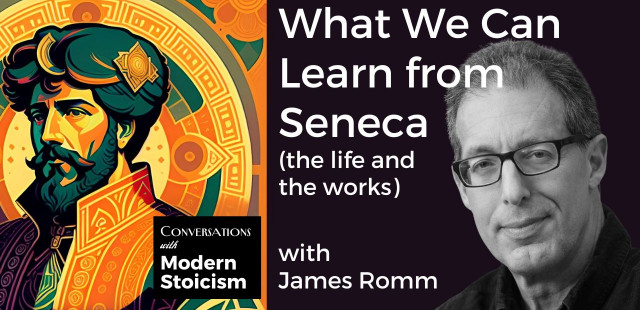Stoicism is for Life, not just One Week
Ryan Holiday

Here we are, with Stoic Week upon us once again.
This is exciting to me because thousands of new people will be exposed to philosophy for the very first time. I say that half-jokingly, knowing that many people including some who majored in it, think they studied philosophy in school. They didn’t–what they read about and did was an interesting intellectual stimulation but it was not philosophy.
Philosophy, as the Stoics saw it, was not abstraction. It was not theoretical. It was designed to help with the problems of life. And in Ancient Greece and Rome, the problems of life were quite real: murderous tyrants, war, plague, civil strife and banishments existed as very real and daily threats–alongside all the other things we deal with today like jealousy, injuries, greed, sickness, envy, and fear.
The Stoics developed a practical philosophy to make sense of this world, one designed to help its adherents thrive, succeed and live good lives. In my eyes, stoicism posits a very simple premise: We do not control the world around us; we control only how we respond. And so we may as well respond well–respond virtuously.
Stoicism, as passed down to us by Zeno, Epictetus, Seneca, Marcus Aurelius and a host of other ancients, is a tool for that response. Epictetus’s “handbook” was picked up by everyone from James Stockdale to George Washington. Seneca was widely admired by the Christians, Thomas Jefferson and the thinkers of the Enlightenment. Marcus Aurelius proved to be equally inspirational to writers like Ambrose Bierce and Robert Louis Stevenson as he has been for statesmen like Theodore Roosevelt, Wen Jiabao and Bill Clinton.
What does this all mean? It means that whatever problem you’re dealing with this week–or in this life–stoicism can be of help.
A few favorites:
On Ambition:
“Ambition means tying your well being to what other people say or do.
Self-indulgence means tying it to the things that happen to you.
Sanity means tying it to your own actions.” – Marcus Aurelius
On Temptations:
“No matter what anyone says or does, my task is to be good. Like the gold or emerald or purple repeating to itself, “No matter what anyone says or does, my task is to be emerald, my color undiminished.” – Marcus Aurelius
On Self-Criticism
“What progress have I made? I am beginning to be my own friend.’ That is progress indeed. Such a people will never be alone and you may be sure he is a friend to all.” – Seneca
On Other People:
“It’s silly to try to escape other people’s faults. They are inescapable. Just try to escape your own.” – Marcus Aurelius
On Distractions:
“Stick to what’s in front of you—idea, action, utterance.” – Marcus Aurelius
On Objectivity
“Don’t let the force of an impressions when it first hit you knock you off your feet; just say to it: Hold on a moment; let me see who you are and what you represent. Let me put you to the test.” – Epictetus
On Success or Failure:
“To accept it without arrogance, to let it go with indifference.” – Marcus Aurelius
“It’s not what happens to you, but how you react to it that matters.” – Epictetus
On Fortune
“The wise man looks to the purpose of all actions, not their consequences; beginnings are in our power, but Fortune judges the outcome, and I do not grant her a verdict upon me.” – Seneca
On Endurance
“Life’s no soft affair. It’s a long road you’ve started on: you can’t but expect to have slips and knocks and falls, and get tired and openly wish–a lie–for death.” – Seneca
**
I was fortunate enough to be introduced to stoicism when I was 18 or 19 years old. Not during a week of practice and contemplation, but a week where I nonetheless needed it very badly. I was going through a terrible break up. I was stuck in this apartment with some roommates who I absolutely detested. I was in my second year of college, not sure in which direction to take my life.
A chance encounter led to me picking up Marcus Aurelius and his wonderful Meditations. The wisdom in this book not only helped me with my immediate problems–helped me see some perspective about my romantic woes and helped me realize there was no reason to resent these people I was living with. But more importantly, it set me on an intellectual journey (going “directly to the seat of knowledge” as Marcus put it) that changed my life and set me on a course I never would have expected.
In the years since, stoicism has something that strengthened me in failure, comforted me in pain, gave meaning to events and cautioned humility and conservatism in moments of success. It helped me publish three books–one of which, I can proudly say, is about stoicism. How this all would have played out otherwise, I really have no idea. But what stoicism teaches is that it doesn’t matter. What matters is what happened and that we must be grateful for it–the good and bad alike.
I am. I am so grateful for the windows and doors that stoicism opened. And I hope for everyone participating in 2014’s Stoic Week that you feel the same. And don’t let it stop after 7 days either.
About the author:
Ryan Holiday is a media strategist and prominent writer on strategy and business. After dropping out of college at nineteen to apprentice under Robert Greene, author of The 48 Laws of Power, he went on to advise many bestselling authors and multiplatinum musicians. He served as director of marketing at American Apparel for many years, where his campaigns have been used as case studies by Twitter, YouTube, and Google and written about in AdAge, theNew York Times, and Fast Company.
His first book, Trust Me I’m Lying: Confessions of a Media Manipulator—which the Financial Times called an “astonishing, disturbing book”—was a debut bestseller and is now taught in colleges around the world. He currently lives in Austin, Texas, and writes at RyanHoliday.net.
He has written a bestselling book on Stoicism, The Obstacle is The Way.




Denis Watkins
I was particularly attentive to Ryan’s comments as I have just read his book “The Obstacle is the Way.” That I immediately bought it as a Christmas present for my daughter says all I need to say about how impressed I was by it.
Ryan says that he found Stoicism when he was in difficult circumstances and was able to use it. This is similar to my own experience and Marcus Aurelius was one of the sources most helpful to me. As he was to Ryan. What I have learned is that using Stoicism in practice, and absorbing it, is different to reading about it. However, reading about Stoicism, and having it to hand, is never wasted.
Admiral James B. Stockdale became immersed in Stoicism before he really needed it. When he did come to rely on it in the harshest of conditions in prison he did not find it wanting. I think Stoicism could be so helpful to so many people if only they were able to discover it. One reason why Stoicism Week can offer so much.
Excellent quotes that Ryan has selected for the post. They truly round out what Stoicism is all about.
[…] Stoicism Is For Life, Not a Week (November 22, 2014) […]
Will there be a Stoic Week 2015. This past event was just wonderful and right on par. I believe it can be really beneficial for most people.